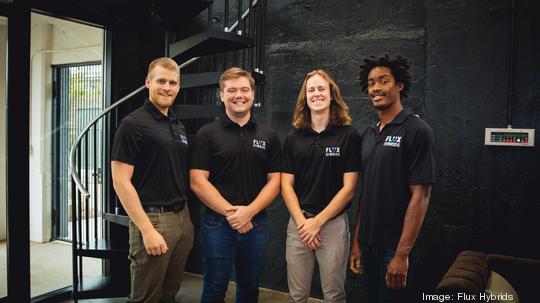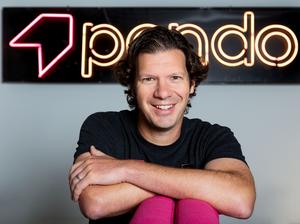
As costs rise in the Triangle – will startups hit the road? A North Carolina State University spin-out is doing just that, packing up and moving its headquarters from Raleigh to Charlotte.
Flux Hybrids – a Triangle Business Journal Inno startup to watch in 2022 – is moving its headquarters to the Queen City (and expanding in Alabama where it participated in Techstars), even as it keeps what co-founder Micah Ulrich calls an “active component” of its business in Raleigh.
Flux is working on ways to convert gas guzzlers into electric vehicles, adding electric power trains to traditional automobiles as a way of making commercial fleets sustainable. The pre-revenue startup has downsized its local presence to just sales and investor relations, moving its HQ and research and development operation to Charlotte. Ulrich said the move will allow the firm to take advantage of automotive resources related to Charlotte’s racing industry.
“We can partner with several automotive experts for necessary custom parts and designing and we were able to cut lead times significantly by locating closer,” he said.
But there’s another reason, too.
“It was cheaper to find automotive shop space here partially due to price increases in the Triangle since Apple announced their new facility,” he said.
Economic development wins such as Apple (Nasdaq: AAPL) and Google (Nasdaq: GOOG) are just part of the reason costs are increasing in the Triangle. In the third quarter of 2021, average rental rates for Class A office space were $30.45 per square foot – up from $29.99 the prior quarter, according to a CBRE market report.
Will other startups follow suit?
But by and large, don’t expect Triangle statups to follow Flux Hybrids’ lead. Investors TBJ talked to said real estate is not really pushing their startups to relocate.
“I have not,” said John Replogle of One Better Ventures in Raleigh. “Real estate has escalated, but it is still reasonably affordable.”
But it is one of many reasons some startups are moving their operations online, multiple investors say.
Lister Delgado of Durham’s Idea Fund Partners said it’s not usually about office cost, but started instead out of necessity. The pandemic forced teams remote, and it just worked better than many of them had expected, he said.
“Small teams find that they can save a bit of money by working remotely,” Delgado said. “So I think this is less a reflection of office costs … I expect that going forward small companies will try to be remote if they can.”
The virtual option
David Gardner, founder of Cary’s Cofounders Capital, said he’s seen multiple startups in his portfolio “go virtual permanently.”
“I think there are pros and cons to this, but when you don’t need a lot of space to start with, it’s a minor expense compared to your people costs, which dwarf everything else,” he said.
Gardner said talent is the big expense – as firms he’s talking to throughout the state are having trouble filling open positions.
Going virtual doesn’t just save on square footage – it also allows firms to compete for talent outside the confines of a commute. And it’s a strategy that’s become more and more popular as firms get aggressive for top caliber talent.
In the meantime, innovators from more expensive metros in California and New York continue to move into the Triangle – citing the region’s low cost of living as a driver. Just this month, for example, cell-based meat startup Pearlita announced plans to launch in Raleigh. Its founder is in the process of relocating from San Diego. She cited cost as a factor in picking Raleigh.








